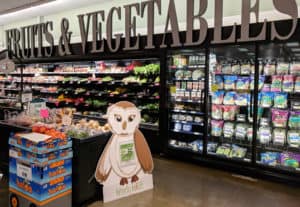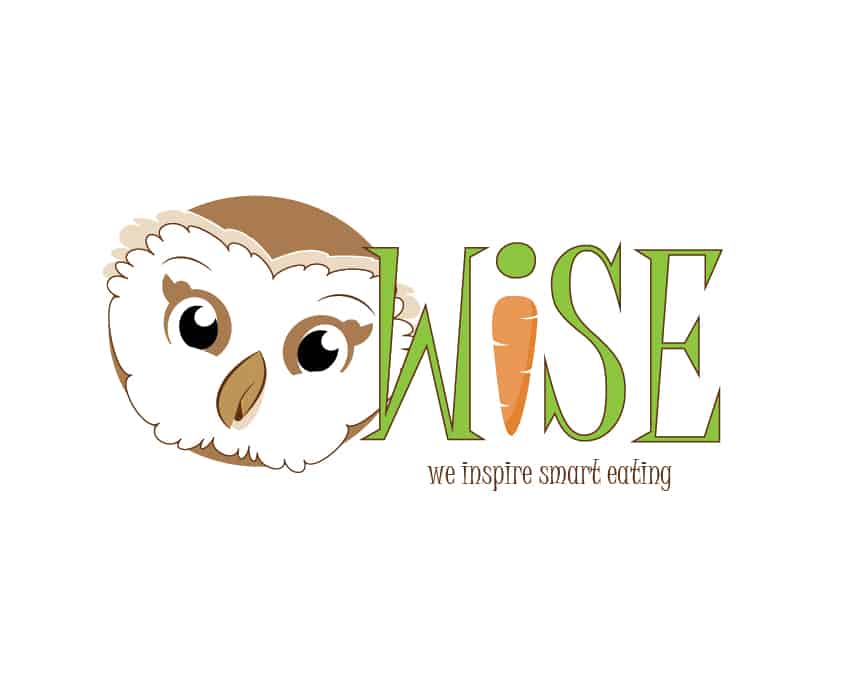When Children Beg for Vegetables: Study Looks into ‘Pester Power’
| Young children have a superpower that UAMS researchers believe can be harnessed for positive change.
It’s called pester power, and it’s exactly what it sounds like: with the right priming, kids can “pester” adults into making healthy food choices. To study pester power, UAMS researchers looked at a yearlong program in which young children were exposed to healthy eating habits.
The parents who reported hearing the most from their children about the healthy eating habits the child learned at school also reported the greatest behavior change in their households. Parents reported that children in these families ate more of the target foods at home and that they engaged more in parenting practices that support healthy eating in children, like role modeling healthy eating and engaging the child in food preparation.

Windy WISE appears in the produce section of some participating grocery stores, reinforcing the concept of ‘pester power’ to healthy foods.
“Pester power has been used in marketing for a long time. Stereotypically, we think of it happening in the interior of the store where the less nutrient-rich foods are, when the child is asking the adult for the box with the friendly cartoon animal on it. But it turns out, children can influence adults around making healthy choices too, said Taren Swindle, Ph.D., assistant professor in the Research and Evaluation Division of the Department of Family and Preventive Medicine.
Swindle tested this theory in a study recently published in the Journal of Nutrition Education and Behavior. The paper was highlighted in a press release and podcast from the journal’s publisher, Elsevier.
The research centers around the Together, We Inspire Healthy Eating (WISE) program. Researchers from UAMS and Louisiana Tech University studied Head Start classrooms in Arkansas and Louisiana that implement the program.
WISE introduces preschoolers to fresh fruits and vegetables like tomatoes, green beans, bell peppers, berries and carrots. The evidence-based lessons were developed by UAMS and harness the power of hands-on learning, psychology and marketing to get children excited about healthy foods.
For example, Windy WISE, a puppet owl, helps introduce the students to the vegetables. Her cartoon image is on the food prep tools the children use, and in some communities with partnering grocery stores, Windy’s face is also found in the produce aisle next to the target foods.

Taren Swindle, Ph.D., assistant professor in the Research and Evaluation Division of the Department of Family and Preventive Medicine
“Often parents start the program saying their child would never willingly eat a vegetable, and then they are surprised to find that their child is begging them in the store for something like green beans,” Swindle said. “The program helps build excitement around healthy eating for young children. We’ve seen that in previous evaluations of the program, but with this study, we were looking at the impact on the parents. The results suggest this form of positive pester power could be a promising untapped area for future exploration.”
WISE and other similar programs focus on helping children develop healthy eating habits at a young age in an attempt to address the obesity crisis, which has numerous health implications.
“We know that early habits predict lifelong habits,” Swindle said. “The focus has been on teaching children to eat a variety of healthy foods at a young age so they are more likely to carry that into adulthood. We also know that if you gain excess weight in childhood, you’re much more likely to have excess weight in adulthood. If we can infuse healthy habits and healthy movement patterns early in life, we’re much more likely to have children who grow into healthy adults.”
Swindle said the WISE program directors are already implementing the findings and thinking about next steps for research.
“This is a great springboard for further study on how we can take better advantage of pester power to bring about positive change,” Swindle said. “We’ve already started implementing this information in the trainings we do with educators. Learning about this impact has helped them be even more excited. It’s really empowering to see in the data that the work they do not only matters for the children, but it has a ripple effect.”
The project was funded by the U.S. Department of Agriculture, the Lincoln Health Foundation in Louisiana, and a National Institutes of Health Research Career Development Award. Collaborators from Louisiana Tech and the Head Start program were also important for the study.
Swindle’s research has been supported by the UAMS Translational Research Institute, including two years of funding and mentored research training in 2014 through its KL2 Program. The institute is funded by a Clinical and Translational Science Award (CTSA) from the National Center for Advancing Translational Sciences of the National Institutes of Health, grant UL1 TR003107.
